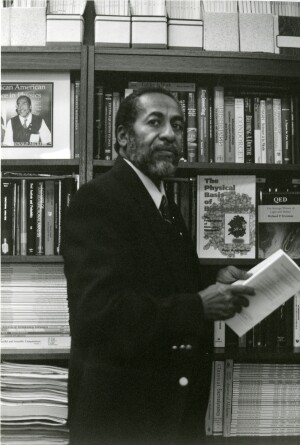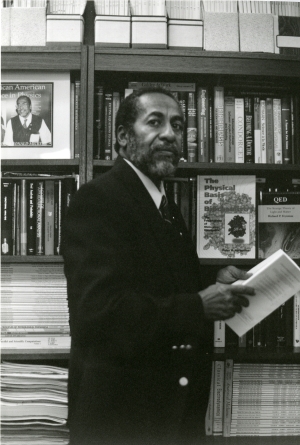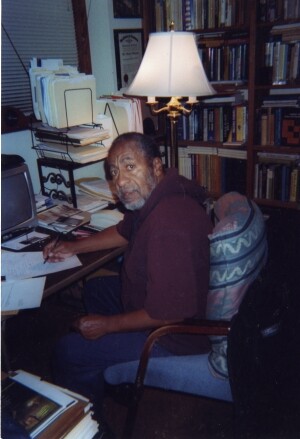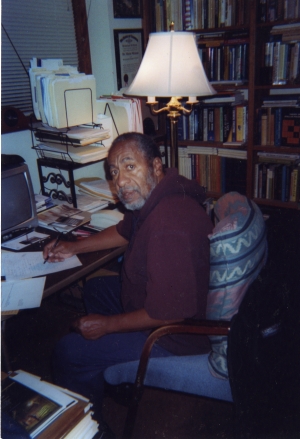
Ron Mickens poses in his office at Clark Atlanta University, March 2002.
AIP Emilio Segrè Visual Archives, Ronald E. Mickens Collection.

Find the corresponding podcast episode here: Initial Conditions - A Physics History Podcast
On June 1st I traveled to Atlanta, Georgia. Leading up to the trip, the Initial Conditions team had been dealing with a number of issues with episode 8. Referring to the “Mickens episode” was our version of the “Macbeth” curse; invoking it was sure to introduce some unexpected technical obstacle that would further delay production.
We planned Episode 7 and Episode 8 in February, well before their September release. Our process usually involves looking at one or a few holdings in the Niels Bohr Library & Archives, preparing an outline of what we want to say, and then writing an episode based on those holdings. Sometimes, to help vet our work, we reach out to scientists and historians with expertise in the areas we research. Dr. Ronald Mickens is both a scientist and a historian. He also donated the research materials I used for this episode to the NBL&A - the Ronald E. Mickens Collection on African-American Physicists

Ron Mickens poses in his office at Clark Atlanta University, March 2002.
AIP Emilio Segrè Visual Archives, Ronald E. Mickens Collection.

On our call, I asked Mickens if he would be willing to look over the outline I had prepared for the episode based on his namesake collection and if he might also be willing to participate in an interview for that same episode. He agreed to both, generously forgoing the honorarium we usually provide to outside reviewers and speakers as a small token of our gratitude for their time and effort. Rather than send the outline by email, Mickens asked for a hard copy. I sent the outline, headphones attached to a microphone, and detailed instructions for plugging them in, to Mickens’s address. This was when the first of several problems emerged. Atlanta is prone to periods of heavy rainstorms that punctuate the long, humid summers. Unfortunately, the annotated outline that I sent along with the headphones was the first casualty of our cursed episode. By the time Mickens checked the mail, the outline was sopping wet, shredded, and illegible. The headphones, encased in plastic, were fine.
No matter, Mickens accepted an electronic copy. We went through it over the phone and he offered constructive suggestions and, when necessary, corrections to my draft outline. After doing so, we set up a time for our interview. On May 4th, we were ready to roll.
The software that we use for recording our episodes is called Riverside. Imagine a Zoom call (I don’t think that’s a stretch for anyone who has communicated with anyone outside of their household since March 2020) but with a producer, instead of a host, running the meeting. The producer can see what sort of audio the guests are using and can modify the audio settings to optimize the sound quality. We have a very talented producer—Kerry Thompson—who has honed her ear for audio quality by working on podcasts like How I Built This, available through National Public Radio. She asks our guests to use microphones, even if they are the small ones available on most recent Apple earbuds, which is what we sent Mickens, because they direct the audio and make for much clearer recordings. Mickens, unfortunately, was unfamiliar with built-in microphones, and we decided to simply record as though we were all in a Zoom; Maura and I used our microphones, Mickens used the external microphone on his computer. The interview went fine, until the very end. Riverside stores each speaker’s track separately, on the computer, before uploading it to the Riverside Cloud. If the connection is broken before the episode is uploaded, the tracks might be unrecoverable. As we were wrapping up—quite literally in the last minute—Mickens froze; the connection had been dropped. I ran out of the studio to tell him not to hang up (I don’t receive cell service in the studio) but it was too late. The tracks were gone.
After a moment to collect my thoughts, I realized that AIP might be willing to cover a trip to Atlanta to talk to Mickens in person. First, though, I would have to check if Mickens would be comfortable with an in-person interview. He was more than alright with the idea. “Tell them they’re going to send you down here” he said, “or I’ll be sure to get on the phone and tell them.” It was an enthusiastic invitation. Allison Rein, the Associate Director for Library Collections and Services at the Niels Bohr Library & Archives and Melanie were also enthusiastic about getting Mickens on the podcast for an in-person interview. I booked the tickets for June 1st and prepared to visit Atlanta for the first time in my life.
I opted to use one of the Tascam recorders that the Oral Historians at the Center for History of Physics—a department the NBL&A works closely with—usually use for their interviews. Mickens had been recorded on one in August 2020, so I expected that he would be familiar with the technology. Jon Phillips, an Oral Historian with CHP, generously lent me a Tascam and walked me through how to use it. I carefully packed it in my luggage and took the metro down to Washington National Airport to await my flight.

Dr. Mickens in his home office.
AIP Emilio Segrè Visual Archives, Ronald E. Mickens Collection.

The next day, after recording a few practice tracks on the Tascam, I drove to Mickens’s house. He lives in a nice home built on a gentle slope in Southwest Atlanta. The neighborhood looked like it might have been developed in the 1950s or 1960s. Ranch-style and split-level homes were the main architectural style. After inviting me in, Mickens offered me a tour, and I had the opportunity to see his spacious office, built downstairs and partially underneath the hillside, and see some of the pictures he had taken during his decades-long career. He also had a few from his childhood in Petersburg, Virginia mixed into the collection.
After the tour we sat down in his kitchen for the interview. I assumed anything could still go wrong, even though I had just loaded fresh batteries into the Tascam. The recording went smoothly, until seven minutes in. The recorder suddenly shut down. Its internal battery had died. I was confused and assumed the fresh AA batteries I put in before I left DC would have prevented that. Thinking perhaps the batteries were defective, I borrowed a fresh set from Mickens. Still no luck. I searched for the cord that came with the Tascam, and when I tried to plug it in, it was the wrong micro-USB.
I knew something would happen. Of course this interview wouldn’t go as planned. I was worried about reporting back to AIP that the interview couldn’t take place. Perhaps we could reschedule for the next morning, before my flight? I could run to Best Buy and find the right cord. No, Mickens said, he had his research group meeting then. “But there,” Mickens pointed to a corner of the room, “that looks like the cord I use to charge my cell phone. Maybe that cord will work?” Mickens’s flip phone saved the day. It was the right micro-USB. I plugged it into my computer and resumed the interview.
After talking for about two hours, we went out for lunch. Mickens took me to Mulan Café after a brief driving tour of his neighborhood. At lunch we talked about his work, he elaborated on some of the points he had made during the interview, and he told me a bit about local events. On our way out of the restaurant, he pointed at a picture in the entryway. The owner had clipped out a newspaper article that featured his picture and posted it on the wall. It ended up being a pleasant end to an episode with abundant technical difficulties.
You can listen to Initial Conditions: A Physics History Podcast wherever you get your podcasts. A new episode will be released every Thursday so be sure to subscribe! On our website
Bibliography
Mickens, Ronald E., editor. Edward Bouchet: The First African-American Doctorate. Singapore: World Scientific Publishing Company, 2002.
Mickens, Ronald E., editor. The African American Presence in Physics. Atlanta: Ronald E. Mickens, 1999. Available here
Subscribe to Ex Libris Universum

Catch up with the latest from AIP History and the Niels Bohr Library & Archives.
One email per month